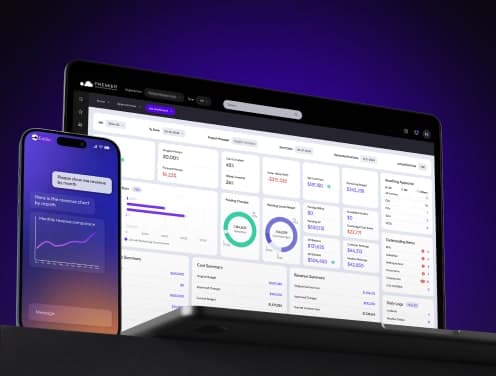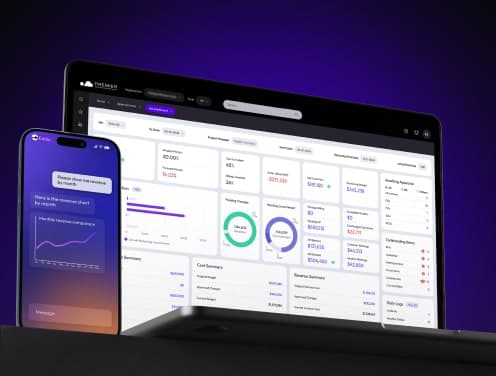
A Legacy System Will Keep You in the Dark Ages - Here's Why You Should Switch to Cloud ERP
In a world where rapid technological advancements define success, clinging to outdated systems feels like wandering through a fog. Legacy systems not only hinder progress but can also cripple organizations with inefficiencies and mounting costs. Understanding the implications of such technology on your business is crucial for staying competitive.
Legacy software often traps companies in cycles of high maintenance expenditures and limited flexibility, preventing them from adapting to market demands. With vulnerabilities that expose sensitive data and a failure to harness the power of analytics, these systems are a recipe for stagnation. Transitioning to cloud ERP can be the key to breaking free from this grip of dysfunction.
This article will explore the numerous pitfalls of legacy systems, delve into the benefits of cloud ERP, and outline the steps necessary for a successful transition. Embrace the opportunity for growth and innovation by stepping into the future with cloud ERP.
The Dangers of Legacy Systems
Legacy ERP systems pose significant risks to modern businesses. They often suffer from version inconsistencies, leading to challenges in maintaining tech uniformity across the organization. Companies using these outdated systems face operational inefficiency and increased costs, negatively impacting profitability and business growth.
Inefficiency and High Maintenance Costs
Legacy ERP systems can be a financial burden due to their archaic design, which demands costly IT resources for maintenance and updates. On-premise systems fail to provide the necessary web-based access, leading to inefficiencies. In contrast, cloud ERP solutions, operating on a subscription basis, eliminate upfront costs and reduce ongoing maintenance expenses.
Limited Functionality and Flexibility
Outdated ERP systems hinder complex business operations and lack the scalability needed during periods of growth. Cloud-based ERP solutions excel in functionality and flexibility, offering modern features and seamless access via internet-connected devices. Their customizable features allow businesses to tailor solutions to suit specific needs, streamlining operations efficiently.
Security Vulnerabilities
Security concerns are a significant risk with legacy systems, whose outdated infrastructure often lacks robust security measures. Cloud ERP providers invest heavily in security protocols, including encryption and access controls, to protect sensitive data. While no system is entirely immune, cloud ERP offers a stronger defense compared to outdated on-premise systems.
Inability to Leverage Data Analytics
Legacy ERP systems lack real-time analytics, making data-driven decision-making challenging. Cloud ERP systems harness the power of Big Data, offering real-time insights into sales, customer trends, and inventory levels. This access enables businesses to track performance and identify improvement areas, enhancing overall operational efficiency and profitability.
What is Cloud ERP?

Cloud ERP, or cloud enterprise resource planning, is a web-based software designed to streamline critical business processes such as finance, payroll, and payments. Hosted on the cloud, it allows businesses to access ERP tools online, ensuring easy scalability, updating, and maintenance compared to traditional on-premises systems. Delivered as Software as a Service (SaaS), it operates on a subscription model, eliminating upfront hardware costs. One of its primary advantages is real-time data access, empowering businesses to make quick, informed decisions no matter where they are. Additionally, Cloud ERP enhances productivity and collaboration by allowing authorized users to contribute to business processes from anywhere, at any time.
Key Features of Cloud ERP Solutions
Cloud ERP is available on the SaaS platform, allowing users to access the software via the Internet from anywhere and at any time. A significant advantage is maximum data security, achieved through regular backups and established systems for consistency and efficiency. Transitioning to cloud-based ERP solutions results in lower operating costs compared to traditional on-site systems since updates and hardware are covered by the subscription fee. It enhances productivity by facilitating remote access, enabling teams to input data and collaborate from anywhere. Also, it features a user-friendly interface with analytical tools and visuals like charts and graphs for informed decision-making.
Differences Between Cloud ERP and Traditional ERP
Cloud ERP systems are managed on remote servers by third-party cloud vendors, whereas traditional ERP systems are installed locally on a company’s servers and require IT staff management. Cloud-based ERP typically incurs lower upfront costs, functioning on a subscription basis, while traditional ERP demands a considerable initial investment in hardware and software. Maintenance for Cloud ERP, including updates and security, is handled by the service provider, freeing businesses from these responsibilities. Cloud ERP systems offer superior scalability, enabling easy resource adjustments in line with business growth, unlike traditional systems, which are less flexible. Additionally, remote access offered by Cloud ERP secures data as it’s not stored on local devices, contrasting with traditional ERP systems where sensitive data may be vulnerable if devices are lost or stolen.
Advantages of Cloud ERP
Switching to a cloud-based ERP system offers numerous benefits that can transform your business processes. By leveraging real-time data access, cost savings, scalability, and improved collaboration, cloud ERP systems enhance operational efficiency and drive business growth. Unlike traditional on-premise systems, cloud ERP solutions provide a flexible, subscription-based model that minimizes upfront costs and maximizes resource management.
Real-Time Access to Information
Cloud ERP systems deliver real-time access to crucial business data, helping decision-makers grasp current operations instantaneously. This enables quick tracking of sales, inventory, and customer trends, optimizing processes especially for manufacturing firms. Teams can work efficiently from any location, thanks to centralized data that reduces inaccurate reporting and forecasting.
Cost Savings
Operating on a subscription basis, cloud ERP significantly cuts software licensing and hardware expenses, making it ideal for businesses of all sizes. With lower implementation and maintenance costs, companies can save money by avoiding traditional IT infrastructure setup. Automated backups and reduced dependence on IT staff further enhance these savings over time.
Enhanced Scalability
Cloud ERP provides a scalable infrastructure, accommodating business growth without heavy investment in resources. Easily adjust users, modules, and locations as needed. This flexibility allows businesses to efficiently adapt to new challenges and opportunities, eliminating the hardware constraints often encountered with on-premise systems.
Improved Collaboration and Communication
Cloud ERP enhances collaboration by enabling remote access to business data, fostering communication across dispersed teams. Real-time data access boosts situational awareness for decision-makers, improving business strategies. Integrating data sharing capabilities eases workflow management and boosts productivity by streamlining interdepartmental interactions.
Improved Collaboration and Visibility
Switching to a cloud ERP system enhances collaboration and visibility across your organization. With seamless information sharing, team members can access data anytime, anywhere via the internet, improving productivity. This accessibility ensures that geographically dispersed or remote teams can communicate and integrate effectively, fostering a more connected business environment. By eliminating operational silos, cloud ERP streamlines business processes, allowing employees to dynamically respond to changes and make informed decisions.
Real-Time Data Access
Cloud ERP systems host applications and information in a central cloud location, providing real-time data access that is always up to date. This centralized approach reduces bottlenecks often found in older systems, minimizing the risk of inaccurate data for reporting and forecasting. Decision-makers benefit from real-time insights into sales, customer trends, and inventory levels, enabling them to quickly identify areas for improvement and react promptly to market demands. The enhancement of customer service and resource usage through timely analytics is a significant benefit of adopting cloud-based ERP solutions.
Cross-Departmental Collaboration
Cloud-based ERP systems simplify communication and project management, fostering cross-departmental collaboration. These systems offer real-time financial and performance reporting, giving decision-makers the situational awareness needed for informed teamwork. The ability for personnel to access and enter data from any location enhances project collaboration, while interaction with third parties becomes more efficient through easy data sharing. This accessibility aids in coordinating efforts across different departments and external partners, supporting streamlined business operations.
Informed Decision-Making
Cloud ERP systems empower decision-makers with real-time access to critical business data, enhancing informed decision-making. The integrated analytics enable insights into trends, facilitating process automation and predicting changes for better resource utilization and customer service. With data accessible from any location, decision-makers can act promptly, ensuring strategic responses to business challenges. Automatic updates and minimal disruptions keep companies equipped with the latest technology, aiding continuous improvement and strategic planning.
Empowering Remote Work
Cloud ERP solutions revolutionize remote work by providing employees with improved accessibility to business data. This capability enables employees to connect from anywhere, using the internet on any device, which facilitates seamless collaboration despite geographical distances. Real-time data availability ensures timely and informed decision-making by remote teams, significantly enhancing operational efficiency.
Mobile Access Capabilities
Cloud-based ERP systems offer exceptional mobile access, allowing users to retrieve and update information anytime and anywhere. This flexibility ensures businesses maintain operational efficiency even when personnel are on the move. Modern solutions prioritize mobile capabilities, delivering responsive and secure access for employees, subcontractors, vendors, and customers without hindrance.
Support for Distributed Teams
Cloud ERP systems enable real-time collaboration and data entry from any location, which is vital for distributed teams. By enhancing cross-departmental communication and integrating data across the business, cloud ERP solutions boost productivity. Moreover, reliable power backups and fail-safes provided by cloud vendors ensure consistent access to crucial business information, minimizing downtime.
Improving Productivity Anywhere
Cloud-based ERP systems empower employees to access and input data seamlessly from any location, enhancing productivity even when away from the office. The integration of real-time data sharing ensures efficient decision-making and promotes cross-departmental collaboration, while eliminating the need for onsite technical maintenance, thereby allowing more focus on core business processes.
The Fear and Cost of Not Changing

Sticking to an outdated ERP can severely impact business processes and profitability. Legacy systems hinder growth and innovation by restricting access to real-time data and efficient testing options. Maintaining these systems involves manual upkeep and hardware costs, leading to increased operational expenses. As the cloud ERP market expands, companies that resist change risk falling behind in technology and efficiency, jeopardizing their competitive edge.
Competitive Disadvantage
Businesses using legacy systems face collaboration and data access challenges, putting them at a disadvantage compared to those with cloud ERP’s improved accessibility. Traditional ERP solutions require significant upfront investments and ongoing infrastructure costs. In contrast, a cloud-based ERP system offers a subscription model with scalable options, making it easier to adapt to market changes and enhance operational efficiency. However, some cloud ERP systems lack customization, which may affect larger firms seeking tailored solutions.
Missed Opportunities
By neglecting to switch to cloud ERP, companies miss substantial cost savings, as cloud systems require less initial capital. Without embracing cloud benefits, businesses lose a chance to improve operational efficiency and gain a competitive advantage. Delaying the switch can hinder rapid growth and management, as outdated systems fail to support scalable operations. Moreover, overlooking cloud ERP’s enhanced accessibility can prevent businesses from adopting remote work solutions vital in today’s work environment.
Increased Risk of Failure
Legacy ERP systems face substantial risks due to hardware limitations and the cost of necessary updates. Mismanaged in-house systems increase vulnerability to security risks and data breaches, given their reliance on internal IT. Unlike traditional ERPs, cloud ERP solutions provide robust data security with automated backups and continuous monitoring. This reduces the likelihood of catastrophic failures in critical industries, ensuring system reliability and securing data against cyber threats.
Transitioning to Cloud ERP
Switching to a cloud-based ERP system can significantly reduce upfront costs by leveraging a subscription model instead of substantial initial investments. By managing data maintenance and upgrades remotely, Cloud ERP systems enhance data security, mitigating risks linked with local storage. This transition also offers improved accessibility, allowing users to access real-time business data from anywhere with an internet connection, even on mobile devices. Additionally, cloud-based ERP solutions provide scalable operations that can quickly adapt to evolving business needs, converting traditional capital expenses into manageable operating costs, yielding notable financial benefits.
Steps for a Successful Migration
A successful migration to a cloud ERP system begins with a comprehensive plan detailing necessary steps to ensure a smooth transition. Having a dedicated account manager enhances communication and support throughout the process. Assigning a consultant and project manager to oversee the implementation is crucial to meet specific business requirements and achieve desired outcomes. By choosing a cloud-based ERP solution, businesses gain access to agile forecasting tools, as well as real-time reporting and analytics, improving decision-making abilities. This migration also alleviates the IT team by shifting routine maintenance tasks to the software vendor, allowing the team to concentrate on strategic objectives.
Addressing Concerns and Resistance
Adopting a cloud ERP system brings data security and privacy concerns, as businesses must trust third-party providers to protect sensitive information. It’s vital to thoroughly vet cloud ERP vendors, ensuring robust security measures and compliance with industry regulations are in place. Dependence on stable and fast internet connections can also be a limitation for cloud ERP systems, impacting full access and functionality. While cloud ERP may offer limited customization compared to on-premises solutions, and data migration can be challenging, the numerous benefits—such as enhanced security and scalability—often outweigh these concerns, making the transition worthwhile for many organizations.
Conclusion
In conclusion, switching to cloud ERP offers numerous benefits that elevate business operations. By transitioning, companies can experience enhanced operational efficiency and scalability, driven by real-time updates and advanced functionalities. This removes the wait for custom vendor updates and seamlessly integrates with current business processes.
Cloud-based ERP systems enable remote access, fostering team collaboration from any internet-connected mobile device. This adaptability supports dynamic work environments, promoting business growth without the constraints of location or additional hardware investments.
Cost savings are another major benefit of cloud ERP systems. Businesses can significantly reduce operating costs by forgoing expensive hardware purchases and minimizing manual maintenance required with on-premise systems. Cloud vendors handle regular updates, ensuring your software stays current with the latest advancements.
Ultimately, engaging with experienced ERP developers can facilitate a smooth transition, tailoring the solution to meet specific organizational needs. For businesses seeking to optimize supply chain management and utilize real-time data effectively, cloud-based solutions provide an effective and flexible platform to drive success.





















